Crisis Support for victims of the Israel and Palestine conflict
The ongoing conflict between Israel and Palestine is devastating, and those affected are experiencing unfathomable grief and distress. We have collated these Palestine & Israel crisis lines for anyone affected, both directly and indirectly.
Alliance for Middle Eastern Peace (ALLMEP)
Website: https://www.allmep.org
ALLMEP is a coalition of 170 organisations seeking to educate and advocate for peace in the Middle East on a global scale.
Palestine Children’s Relief Fund (PCRF)
Website: https://www.pcrf.net
PCRF is a volunteer-based non-profit providing free medical care to thousands of injured and sick children. They are currently mobilising urgent support for children in Gaza amidst the ongoing crisis.
Doctors Without Borders
Website: https://www.doctorswithoutborders.org
Doctors Without Borders provide independent, impartial medical humanitarian assistance to the people who need it most. They support people affected by conflict, disease outbreaks, natural and human-made disasters, and exclusion from health care in more than 70 countries.
Magen David Adom in Israel (MDAIS)
Call: 101
SMS (for Deaf users): 052-7000-101
Website: https://www.mdais.org/en
MDAIS is a National EMS Organisation aiming to provide auxiliary service to the IDF medical forces in wartime. They also provide life-saving First Aid training through volunteers and medical transportation for people who are sick, victims of accidents, women in labor, and more.
IsraAID
Website: https://www.israaid.org
IsraAID is dedicated to supporting victims of humanitarian crises through disaster relief, emergency response, and supporting individuals impacted by forced migration.
Medical Aid for Palestinians (MAP)
Website: https://www.map.org.uk
MAP aims to provide emergency medical response in Palestinian communities and break down barriers to Palestinian healthcare. They are providing emergency response to the current escalating violence.
Sahar
WhatsApp (Arabic): +972 54-322-5656
WhatsApp (Hebrew): +972 55-957-1399
Website: https://sahar.org.il
Sahar is dedicated to providing free and confidential support and information over online chat. They support everyone in Israel who may need emotional support with anxiety, depression, loneliness, suicide.
Finally, if your mental health has been impacted by recent events, we have international helplines available: https://safeinourworld.org/find-help
Skills utilised:
Crisis Hub
Safe In Our World Launches Crisis Hub
We have launched our new Crisis Hub, aimed at offering more targeted resources and support to those affected by crisis.

We want to make it as easy as we can to signpost people to useful resources, charities, and even games that we think could be of use during this turbulent time. Click to visit any of the resources below. We’ll be continuing to grow the content within the hub to provide as much support for those in need as possible.
How to support yourself and others who are indirectly affected by conflict
Verifying information and limiting news time
Charities supporting those affected by war
Safe in your virtual world: using video games as a healthy break from the news
Dealing with grief – advice and video games that explore themes of grief
How to talk to children during crisis
Crisis Support Lines for those dealing with war
and PTSD Awareness – how to support yourself and others, information and signs
We’re incredibly grateful to Embracer, Koch Media and Form for supporting the creation of the Hub
Skills utilised:
Crisis Hub
Crisis Support Lines for victims of conflict in Ukraine
The events in Ukraine are deeply saddening and distressing. If you are currently in Ukraine, or know someone who is, please make sure they are aware of the following contact details for support around the clock.
Emergency Services
Call: 112
112 is the universal emergency number in all 27 EU member states, as well as other European countries. This number can be accessed by landline or mobile to reach the fire brigade, medical assistance and/or the police.
Lifeline Ukraine
Call: 7333
Website: https://lifelineukraine.com/
While originally established as a mental health support line for Ukraine Armed Forces veterans, Lifeline Ukraine is offering help to anyone in the country who needs it right now.

The Red Cross
The Ukrainian Red Cross Society
Call: 0800 331 800
Website: https://redcross.org.ua/
The Ukrainian Red Cross Society can be contacted from anywhere within the country for on-the-ground assistance – including, but not limited to: medical items, shelter material and essential deliveries.
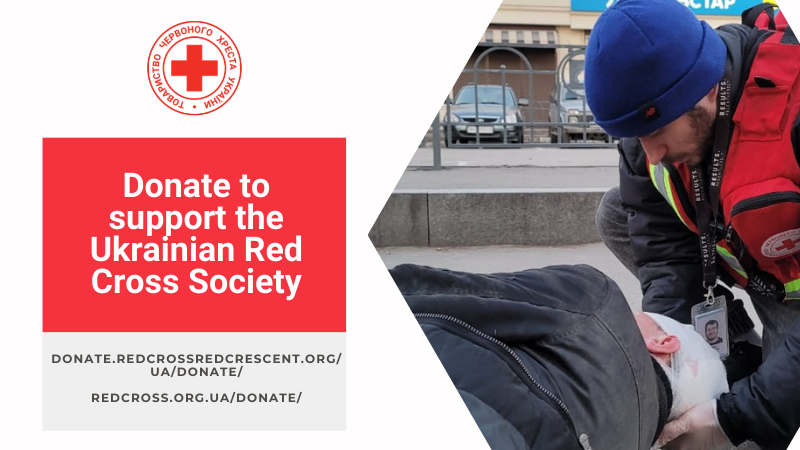
The International Committee of the Red Cross (ICRC)
The ICRC is working to deliver urgent medical items to Kyiv hospitals, as well as food, water, and other essential items to the areas affected most. The ICRC can be contacted in the following locations 24/7.
Kyiv: 0800 300 155
Slavyansk: 0800 300 115
Severodonetsk: 0800 300 125
Mariupol: 0800 300 165
Donetsk: 0800 300 185
Luhansk: 0800 300 195

Migration Support
Safety advice for those leaving Ukraine is provided by the International Organisation for Migration (IOM), with hotlines available for a number of countries listed on the IOM website here.
The United Nations High Commissioner for Refugees (UNHCR) provides additional safety advice for those remaining in Ukraine and for those leaving – linked above and here.
Parental support for children
The Global Protection Cluster provides a help sheet for supporting children during bombing here.
Guidance and resources UK
The following resources can be access via the UK government website:
- Frequently asked questions on UK visa support for Ukrainian nationals
- Apply for a Ukraine Family Scheme visa*
- Visa support for Ukrainian nationals in the UK
- Travel advice for British nationals in the Ukraine**
- Homes for Ukraine scheme information
* (or call 0808 164 8810 free 24/7 from anywhere in the UK)
** 24-hour consular assistance helpline: +380 44 490 3660 (from Ukraine), +44 (0)1908 516666 (from the UK)
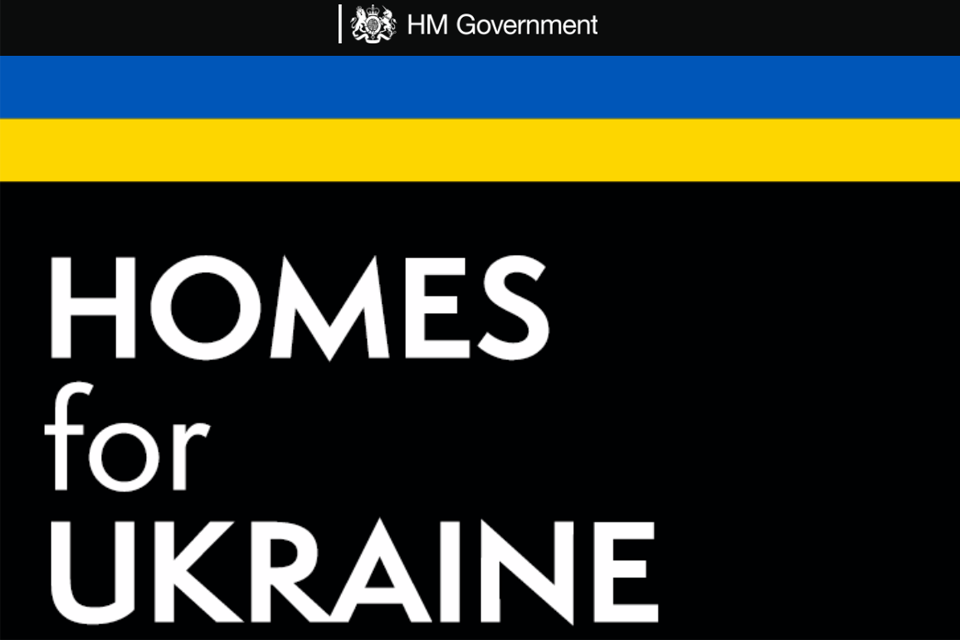
Skills utilised:
Crisis Hub
How to talk to children during a crisis
It can be hard enough to get your own head around an ongoing crisis situation, let alone explaining it to an inquisitive child. Here are some useful pointers to help get the conversation started…
Children are naturally curious and inquisitive, and that means that during a crisis they’re bound to have a lot of questions. Of course, they may also have their own fears and concerns, both for themselves and for those directly involved, and so talking to children and answering their questions can feel like an intimidating prospect.

Photo by World Vision – WV Romania staff members Nicoleta Popa and Alberto Roca with Ukrainians on the border with Romania called Vama siret.
To help put everyone’s mind at ease, the likes of Save the Children and the British Red Cross have put together some useful guides on talking with children, with the latter hosting a wealth of great educational resources to help learners discuss and understand a range of related issues and situations. Here are some of the key elements you might want to consider to help make the conversation go a little smoother and hopefully be more rewarding for all involved!
Be Impartial
Conflicts and other crisis scenarios can be a difficult and emotive topic that can impact on people in different ways, especially with children. Before you start the conversation, it can help to try and evaluate your own feelings or possible biases on the subject. It’s not too unlike our article looking at verifying news information, only here you’re the source, so try to make sure you’re dealing with facts and not allowing your own emotions to influence the discussion.
Not that you should ‘turn off’ your feelings entirely; just try to appreciate that children may interpret the situation in a slightly different way. Remember, your aim is simply to get them to better understand or process the events to help put their minds at ease, and this needn’t be aligned with your own opinions. Among the seven key principles the Red Cross Movement follows are neutrality, impartiality and humanity, and applying those to a crisis situation is a good foundation for any discussion.
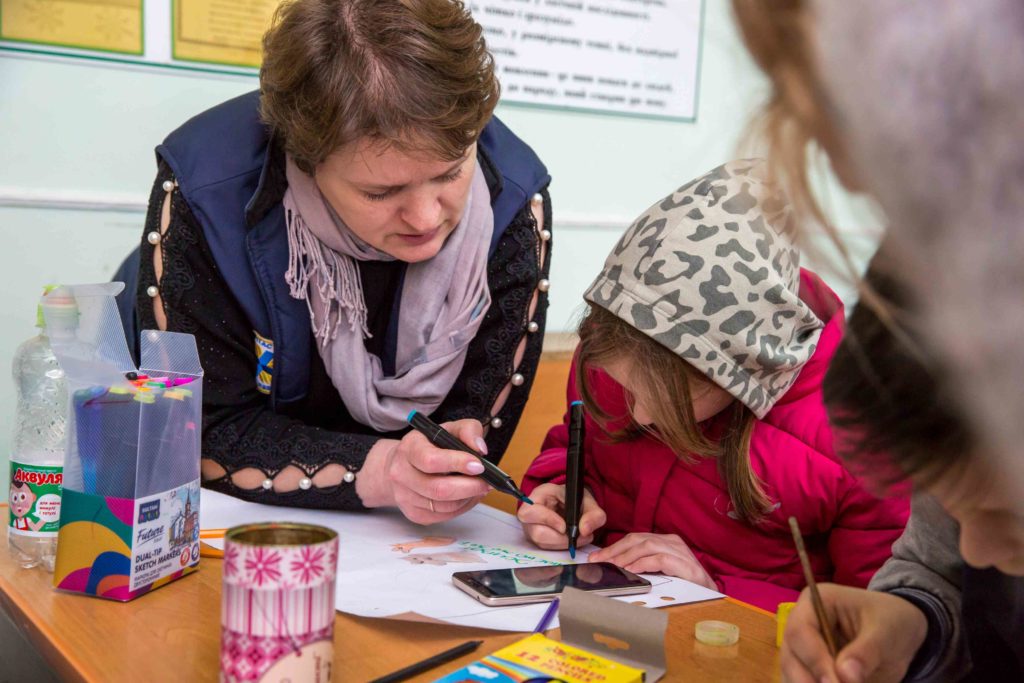
Photo by Igor Shokha & Photo Shokha Studio: Children take part in art therapy at one of the safe places set up by CAFOD partner Caritas Ukraine in Boryslav
Prepare What to Say
The British Red Cross offers a checklist of questions to ask yourself before addressing a classroom: What do your learners want to talk about? How are your learners feeling? What can you do to help your learners? What could learners learn about? Even if you’re dealing with a single child, it’s worth considering these questions to help you frame the conversation you may have.
Create a Supportive Environment
It’s important to remember that children can have personal connections to an ongoing crisis, which can extend into other issues such as race, migration and national/cultural tensions, so be sure to accept and empathise with any concerns they may express. It can also be important for your impartiality to extend into not simply painting one side as the ‘bad guy’ and de-humanising those involved, as that may help fuel a ‘monster’ that could add to the child’s fears.
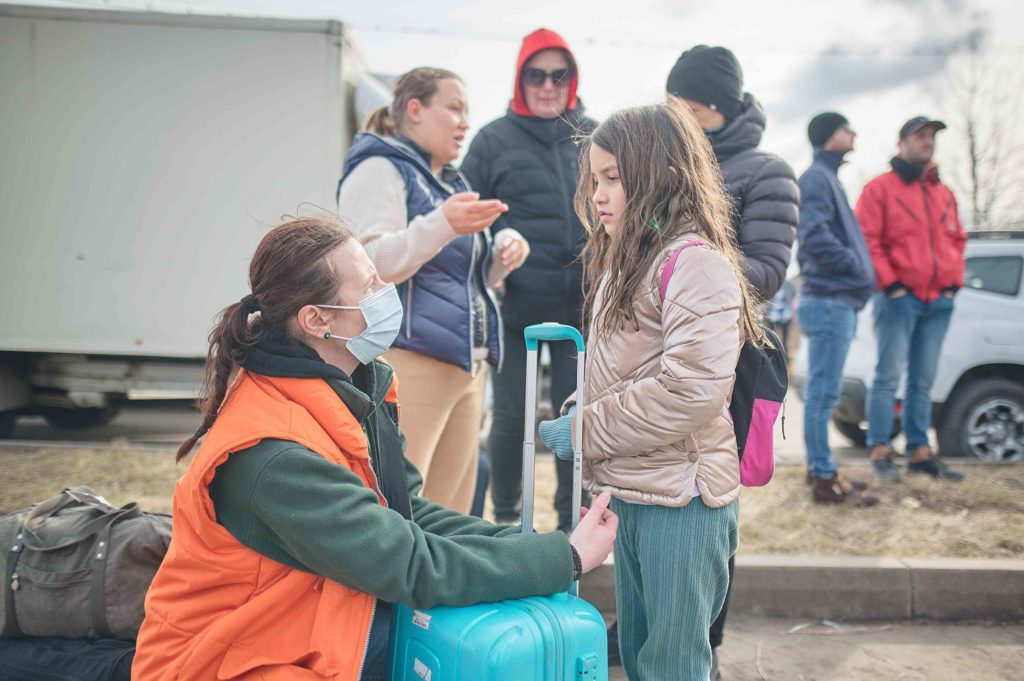
Photo by World Vision – Movement of Ukrainians on the border with Romania called Vama Siret.
Answering Questions
An all-important part but arguably the trickiest one. The first step is to positively acknowledge each question, even if you don’t fully know the answer. It can encourage children to be confident enough to ask questions and opens up scope for a discussion from both sides. It’s perfectly okay not to know all the answers. Be honest about your own understanding and knowledge of events and if you don’t have the answer perhaps you can team up together for a little research to help you both make things a little bit clearer!
Be Clear and Concise
Children are great at asking lots of questions, so try to keep your answers direct and to the point. Don’t elaborate too far on an issue if the child doesn’t ask you to and try to remember to keep your impartiality intact, responding more with factual information than your own personal viewpoints.
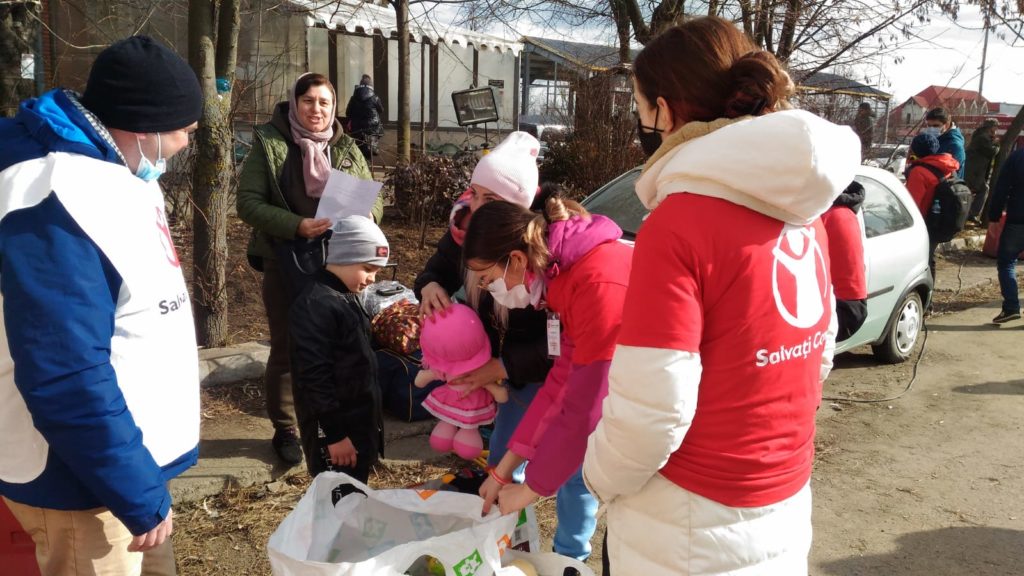
Photo by Save the Children: All children received toys. Water, juices, hygiene kits, face masks, perishable foods, kits for newborns (pampers, wet napkins) are available for every single family that crosses the border. We are also offering flyers that contain necessary information.
Take Their Fears Seriously
This may sound obvious but, as mentioned, children can interpret and analyse events in different ways to adults. They may not agree with everything you say, or have some strong opinions of their own that might not align with your own feelings, so try to be understanding of their views, ideas and worries, and not force your own upon them.
Offer Them Hope
This may be easier said than done, but you want to help make the child feel reassured about the situation. Explain how it’s adults who have the responsibility to find solutions and that are many very good people working on doing just that right now. There can be a sense of powerless in these situations that may be a source of anxiety, so you might want to suggest ways that they can also get involved to help those it does impact.
This could involve supporting fundraising events in the local area or even just making a small donation to a related charity to let them know that they can make a difference. Similarly, encourage them to learn more about the crisis and show their support to those directly impacted by it, as kindness and compassion can also be very welcome commodities to share as part of any relief response.
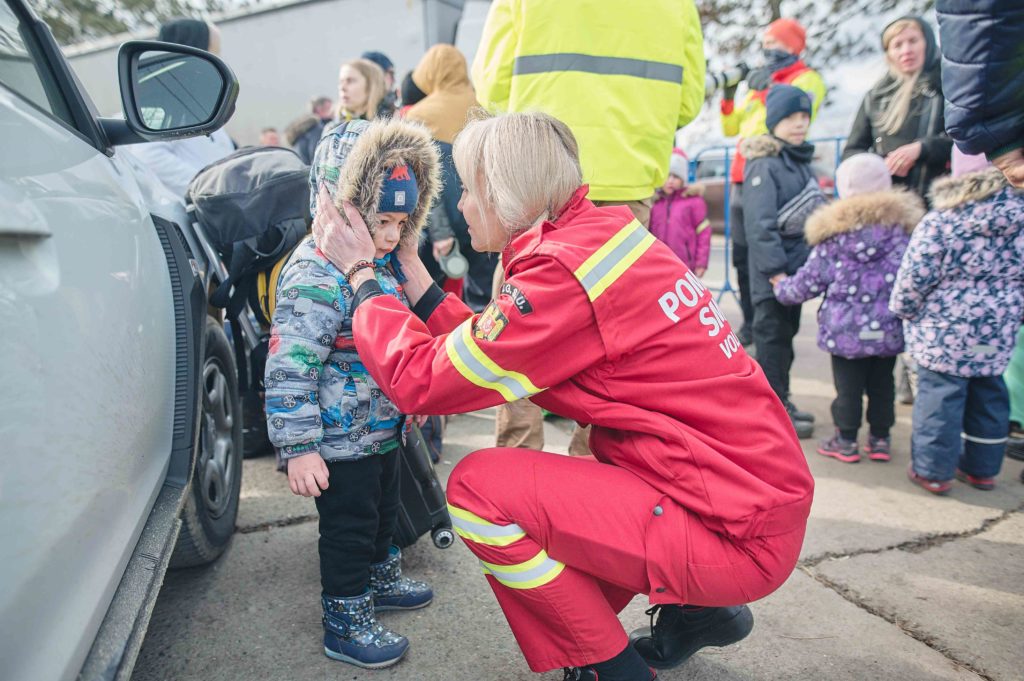
Photo by World Vision – Romanian firefighters helping Ukrainians on the border with Romania called Vama siret
Take a Break
Similar to how we’d recommend taking a break from the ongoing news cycle to give your mind a breather, you don’t have to squeeze in a full discussion about something like Covid, Ukraine, or Israel and Palestine in a single sitting. Feel free to let the conversation drift into something completely different to give you both time to process the difficult topics and perhaps let something fun lighten the mood. You don’t want to force the conversation, so let the child lead if and when they want to revert back to more serious issues.
Fake News
As discussed in our article on verifying information, there can be a lot of misinformation, particularly on social media, spread during a crisis and children will as vulnerable to it as most. Explain to them that false, or at best misleading, information can be appearing on their platform of choice and that they should ask you (or another adult) if they’re unsure if something is true or not. As with the confidence to ask questions, being able to understand that not everything they read may be strictly true is an important step in helping them to process their day-to-day interactions with the evolving events.
Skills utilised:
Crisis Hub
How to support yourself and others who are indirectly affected by conflict
Seeing the events in Israel and Palestine, and the ongoing crisis in Ukraine, can be extremely shocking and upsetting, and experts agree feeling overwhelmed is a perfectly natural response.
For those directly affected by the current unrest in Eastern Europe, a number of crisis helplines are available to call free-of-charge, and we’ve gathered further resources on dealing with grief and PTSD awareness. For those sharing the distress of a nation from afar, the following information is designed to help you support yourself, your family and others indirectly affected by conflict.
We also spoke to the Samaritans (a registered charity aimed at providing emotional support to anyone in emotional distress, struggling to cope, or at risk of suicide throughout Great Britain and Ireland, often through their telephone helpline) about their tips on how to support ourselves and each other through this turbulent time.

It’s worth saying first that as people deal with war on their doorstep, it’s natural to experience feelings of guilt when you choose to switch off from the news. You may ask yourself, ‘how can we possibly take a step back when people are fighting for their lives?’, but it’s important to accept that focusing on your own day-to-day life does not mean you’ve stopped caring about the lives and strife of others. Social media in 2022 is all-consuming, which means it’s especially important to govern screen time in times of crisis.
“Take a look at what push notifications you allow for each app,” UK and Ireland charity Samaritans tells us. “Turning off alerts to news and social media apps might help you to make a more conscious choice about when to open apps and give you more control over when you read news.”

Samaritans says that curating your social media feeds can help you have more control over what you actually read and see, therefore following trusted news sources is important – as is blocking or muting unhelpful and potentially untrustworthy accounts. On Twitter, for example, you can take this process one step further by choosing to filter or mute certain words, terms and hashtags in order to prevent certain content from appearing on your feed.
The idea of conflict is an unfamiliar one for many people living in European countries, which makes feelings of anxiety around what might be around the corner on a global scale perfectly normal. Mental health charity Mind stresses the fact that anxiety is a natural human response, one that’s experienced whenever we feel under any sort of potential threat. To this end, while often uncomfortable, feeling anxious may be how we’re expected to feel in trying circumstances such as what we’re seeing in Ukraine, and doesn’t necessarily mean someone is experiencing issues of mental health by feeling anxious in these instances.

Still, anxiety can be a very difficult thing to process – this information provided by Mind explains what anxiety and panic attacks are; and includes possible causes, and how you can access treatment and support for yourself and others. Should you wish to explore other, more hands-on avenues of support for Ukraine and other areas experiencing conflict – such as attending peaceful protests and donating to charity – this list of information and advice from Global Citizen provides 29 meaningful ways you can contribute and help out from afar.
No matter how you engage with the conflict in Ukraine, or any other conflict for that matter, being mindful of how much you consume can be crucial to your mental health and sense of wellbeing.
Samaritans adds: “Try setting a limit for your screen time, or allow yourself a set time for reading the news. Remember: If you’re struggling, you’re not on your own. Talk to your friends, family or someone you trust about how you’re feeling. Or, if you don’t feel like you have anyone you can turn to, our volunteers are here to listen if you need to talk it through.”

If you require support related to any of the above, or anything else related to the mental health and wellbeing of yourself or others, you can contact Samaritans FREE any time on 116 123. Samaritans can also be reached via email jo@samaritans.org with a response time of 24 hours.
For global resources, please visit our Find Help Page where you can find a wealth of helplines, support and information relating to where you are in the world.
Skills utilised:
Crisis Hub
Verifying Information and Limiting News Time
How to make sure you’re getting the truth without overburdening yourself with difficult or even false information.
Whether it’s the conflict in Ukraine, the continuing concerns about Covid-19 or the accumulative factors in the rising cost of living, it can important to keep yourself informed of the latest developments. However, with so much information, and the rise in misinformation, particularly online, if can be difficult to know what to believe. Such is the wealth of often contrasting or even contradictory reports, it’s perfectly normal to feel anxious as a result but there are a few steps you can take to help put your mind at ease.

Photo by Adrienne Surprenant/MYOP: Poland and Ukraine refugees. Courtesy of DEC
We may all have our preferred and trusted sources of news, whether that’s the BBC or our daily newspaper (and/or its website and social media feeds), but even those aren’t always a guarantee that the information you take away from a news story is entirely accurate – or at least a fair reflection of your own situation within the unfolding events. The likes of the British Red Cross have posted articles looking at the effects of news on vaccine hesitancy for Covid-19 and the same theories can be applied to other crisis scenarios.
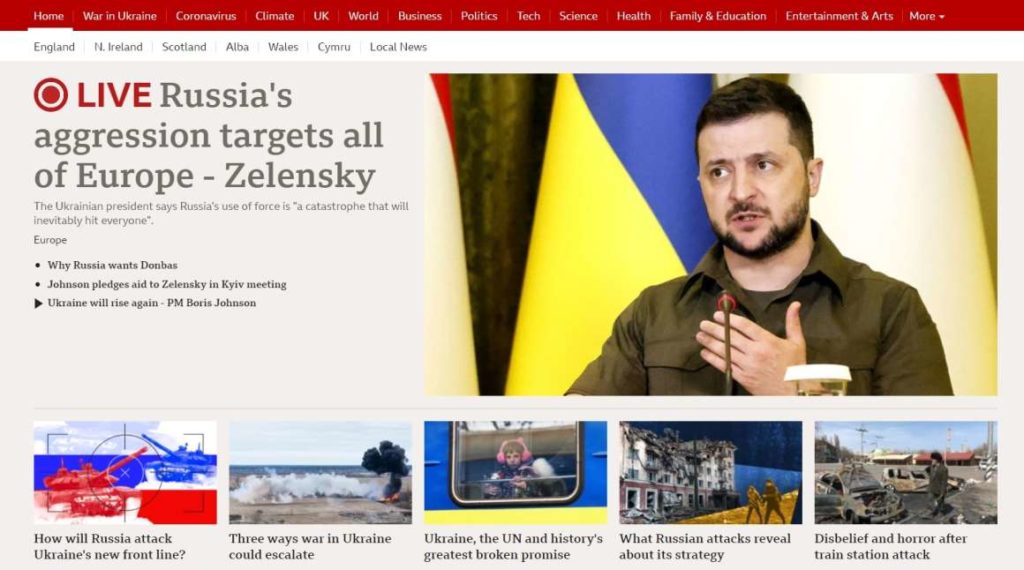
Asking Questions
Of course, the likes of social media provide a platform for all voices to present themselves in your news feed, some of which are actively pursuing false, or at best controversial, narratives for personal or financial gain. To filter the good from the not-so-good, it can help you to process their intentions by keeping a number of simple questions in mind. One of the more obvious starting points is to consider the source of the article.
As mentioned, you may have your own trusted news outlets but you’ll find links to numerous other websites proclaiming to have the inside scoop on the latest developments. The first step is to evaluate the intentions or assumed neutrality of the source. Is it a nationally-recognised outlet with a clear history of quality news coverage? Does there seem to be a certain bias or agenda at play (both in the article and from the outlet as a whole)? The same questions can be applied to the author if a byline is given, while it’s also worth checking the date as old posts are often regurgitated as breaking ‘news’ simply to generate extra clicks.

You can also relate the same thinking to the people or experts quoted in the article. Are they a known and reliable source (such as those mentioned in our charities and crisis support articles)? For example, when it comes to Covid, a quote from some directly involved with the NHS or World Health Organisation may carry more authority than a general soundbite from a largely unknown or vaguely attributed source – such as someone just described as a doctor or ‘an expert’ rather than being given a specific job title or linked to a known organisation.
Many people claiming to be political experts or even doctors won’t have the same qualifications or experience as those they claim to know better than, so you might want to do a little research into those quoted. Were they working in related fields before this situation arose? Do they have a job title or a biography that supports their given field of expertise? Could they simply be seeking to raise their own personal profile by saying something outlandish? If you’re still not sure, you might want to check if their comments are reflected by more familiar expert figures or official organisations.
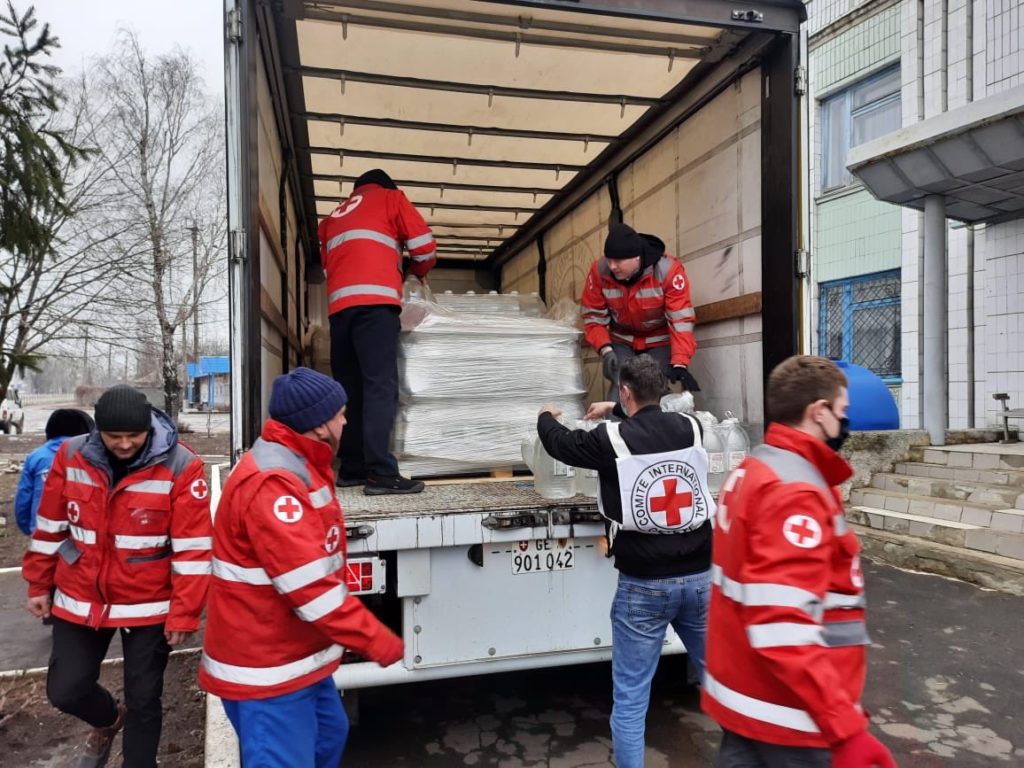
Photo by Polish Red Cross: ICRC teams deliver 16,200 litres of potable water to Olenovka village in Donbas on February 25. Courtesy of DEC.
Of course, online it’s even easier for such information to be faked, so just be on the lookout for newly-created accounts or bots that repeat the same kind of content. You should also be wary of those looking to mimic or replicate the appearance of official organisations such the NHS or Red Cross, by using similar logos, fonts or web addresses – even pretending to be connected to such an organisation, but if you hover your cursor over a weblink you’ll see it redirects you somewhere completely different.
In short, don’t be afraid to ask questions and to doubt even your most trusted sources. Mainstream outlets are not immune to misinformation, or may have a story that presents a certain narrative but the information inside it might include contrasting expert analysis. Be sure to draw your own conclusions from the full article, rather than making quick assumptions based on the headline or a soundbite shared on Facebook or Twitter. You can also use resources such as the BBC’s Reality Check or Full Fact to help point out the half-truths and false narratives.
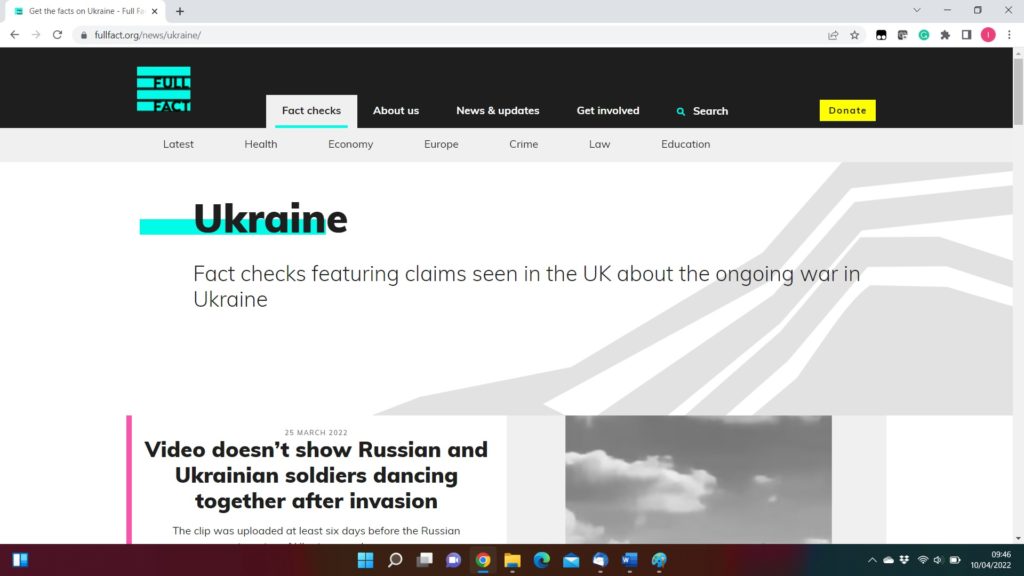
Limiting Your Exposure
With so much information, and misinformation, out there it can feel overwhelming at times, so do allow yourself some breathing room by taking a break from it all. Even small steps such as disabling videos from auto-playing potentially distressing footage as you scroll down can help. While it’s good to be informed, there’s also such a thing as too much information, and taking some time out to let your brain absorb and process the latest events can be far more productive than endlessly scrolling through a blur of social media posts. Maybe there’s a game or three you can happily distract yourself with for a few hours!
If you can, talk to friends, family or someone you can trust to have an open conversation with. The chances are they’ll have been looking at the same stories as you have and share many of the same fears or questions, so being able to talk things through can help both of you to further understand some of the more complex issues. Ideally it should also give you a little more reassurance about what might be true and what might be rather more contentious – and maybe give you a few new leads on where to find the right/best information.

Photo by World Vision: Romanian firefighters helping Ukrainians on the border with Romania called Vama siret. Courtesy of DEC.
Despite those on social media loudly proclaiming the opposite, when it comes to staying on top of ongoing crisis events, accept that you can’t be an expert on everything. Instead, be happy that you’re able to stay well-informed with key information from trusted sources. There may well be several sides to any given story, and there’s merit in having at least an appreciation of all of them, but take care to check statements against facts, and that those making them have the creditability and authority to be trusted. Facebook shouldn’t always be taken at face value…
No-one can avoid being distracted by misinformation all the time, but by asking the right questions and being honest with yourself that the answers might not always suit what you want to hear, you should be able to analyse things with a greater confidence. Just don’t forget to give your mind a breather from time to time to let your brain process everything and allow yourself some stress-free ‘me’ time!
Skills utilised:
Crisis Hub
Charities Supporting Those Affected by War
At any time of crisis there’ll be no shortage or people and organisations asking for your help – but where should you look to find out how or where to best to lend support?
Whether it’s the conflicts in Israel and Palestine or Ukraine, Covid-19, climate change or any other disaster or emergency response scenario requiring swift and ongoing humanitarian aid, there are a wealth of charities and organisations ready and willing to head straight for the frontlines or wherever their help will be most valuable. As individuals, we may all want to play our part in supporting those efforts, or simply following their continued work to help keep track of the evolving situation.
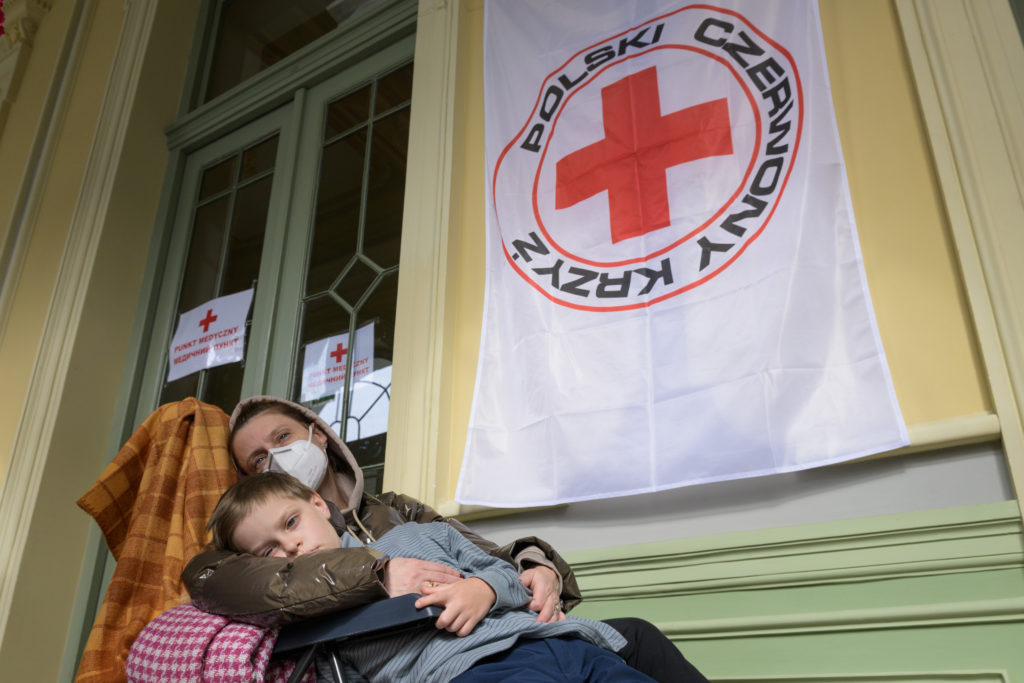
Photo by Anthony Upton/DEC: Yulia and her son Danilo 10, sit in Przemysl train station in Poland, on 3 March 2022. They have travelled for two days from Kyiv and will be staying with friends in Poland. The Polish Red Cross are supporting people at this station. Courtesy of DEC.
However, with a lot of names and organisations being actively promoted, it can be hard to know where you should be focusing your attention. Social media obviously broadens the scope beyond the likes of TV and newspaper appeals and so it can feel like an impossible task to choose one over another – and, of course, it does also open up the potential for those with less honourable intentions seeking to profit from the tragedy.
Certainly those operating on a global scale, such the Red Cross and Save the Children, will have a largely recognisable profile that you may well be familiar with. However, you may also find regional or local charities that seem to be doing great work but without the same resources for to get their message across – so how can you tell who to support… or who to trust?

Photo by Maksym Trebukhov/International Committee of the Red Cross: Ukraine Crisis Appeal – URCS staff and volunteers help people sheltering in subway station. Courtesy of DEC.
Similar to how you might want to verify your news sources, there are a few things you can do to make sure your money is going to a good cause. Firstly, check their online presence. A clear and detailed website should be a given (charities commonly use a .org domain name, but it’s not a requirement), and it should also provide contact details including an office address (that you can check is real via Google Maps) and a contact phone number (that’s not a mobile!).
You can also look it up through the Charity Commission for England and Wales, with similar sites for Scotland and Northern Ireland, but bear in mind that some smaller charities may not be registered, while other non-profit organisations working under different rules may not be either.

Photo by Polish Red Cross: ICRC teams deliver 16,200 litres of potable water to Olenovka village in Donbas on February 25. Courtesy of DEC.
For added peace of mind, you can also check for references to the charity from other related websites or search for proven examples of its charitable work, such as blog posts or news stories from a trusted source. Some fake sites may copy and paste content from creditable sources so they look active, but they should be easy to spot with frequently inconsistent or out-of-place references. If you’re in any doubt at all, then it’s probably best avoided, and you can instead look at some of the more recognised names, such as…
The Disasters Emergency Committee
Launched in 1963 the DEC currently brings together 15 leading UK aid charities in a combined effort to raise funds quickly and efficiently at times of crisis. By pooling their resources, the DEC and its members can provide an essential part of the UK’s response to any ongoing crisis. It also houses a Rapid Response Network made up of national media outlets and corporate partners to help raise the alarm and spread the message during times of need.
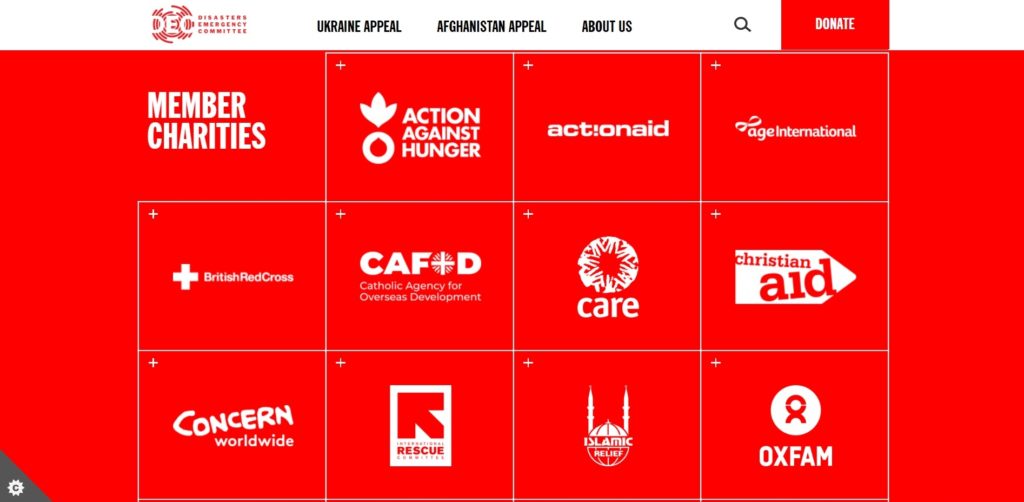
You may well have seen its name and website (www.dec.org.uk) listed on many charitable appeals, and you can be sure that any donations made through it will be redirected to where it’s needed the most. Alternatively, you might want to support one of its members directly, to help target your support in an area that matters the most to you.
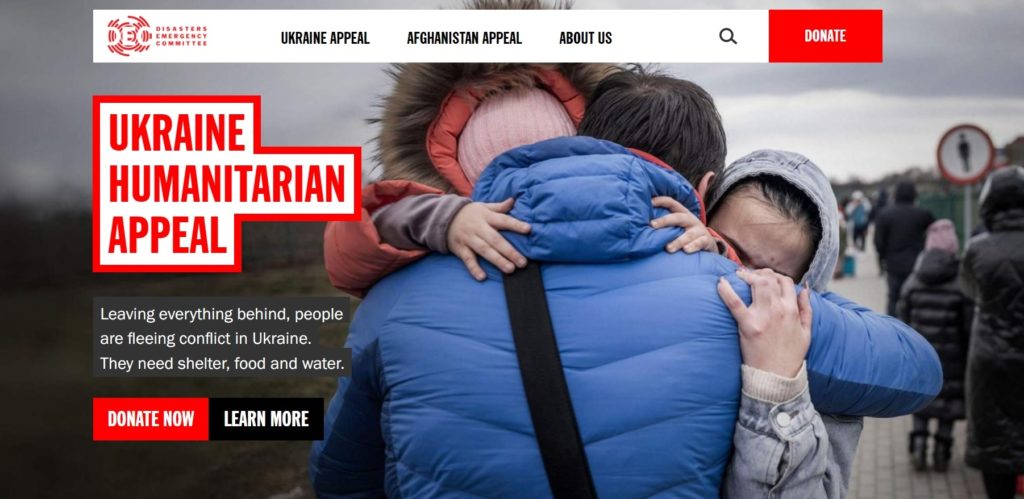
Action Against Hunger:
Action Against Hunger is an international charity committed to saving the lives of malnourished children and supporting their families to beat hunger It is currently reaching out to 46 countries, including the ongoing situation in Ukraine as well as events in Afghanistan, Syria and more.
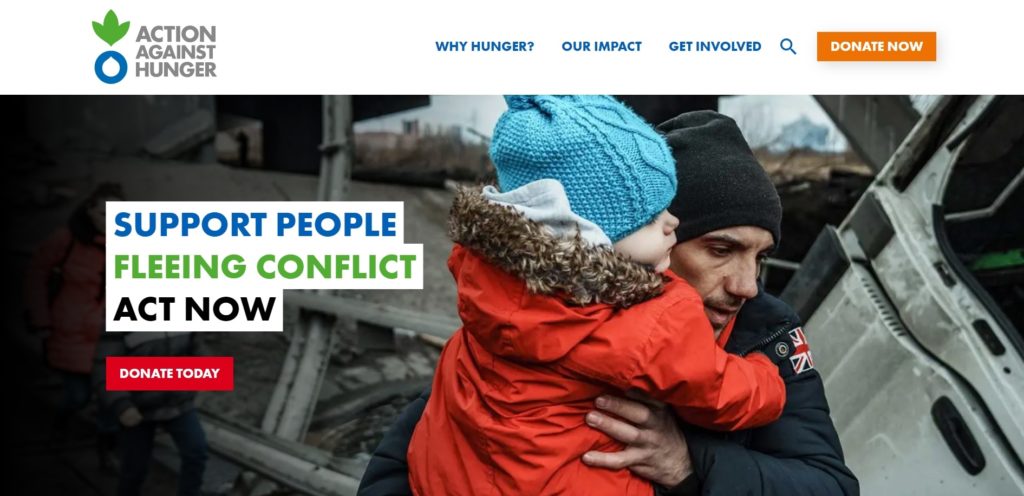
Action Aid:
Action Aid is an international charity that works with local women and girls to end violence, tackle poverty and fight for women’s economic rights. As women are more commonly more affected during disasters and emergencies (with violence against them also increasing), Action Aid looks to empower local women to lead the response.
Age International:
Age International (a subsidiary of Age UK) is here to make the world a better place for older people in some of the world’s poorest places. It seeks to reduce poverty and improve health, while promoting rights and responding to emergencies, including the conflict in Ukraine and the Covid-19 pandemic.
British Red Cross:
The British Red Cross, as part of the wider International Committee of the Red Cross (and further Red Crescent organisations), is a volunteer-led humanitarian organisation that helps people in crisis, bringing together a network or more than 4,000 staff and 21,000 volunteers. As well as its own UK emergency response efforts, it also unites with other Red Cross and Red Crescent societies around the world to prevent or ease human suffering. In times of conflict it helps refuges and asylum seekers as well as protecting people directly involved to save lives.
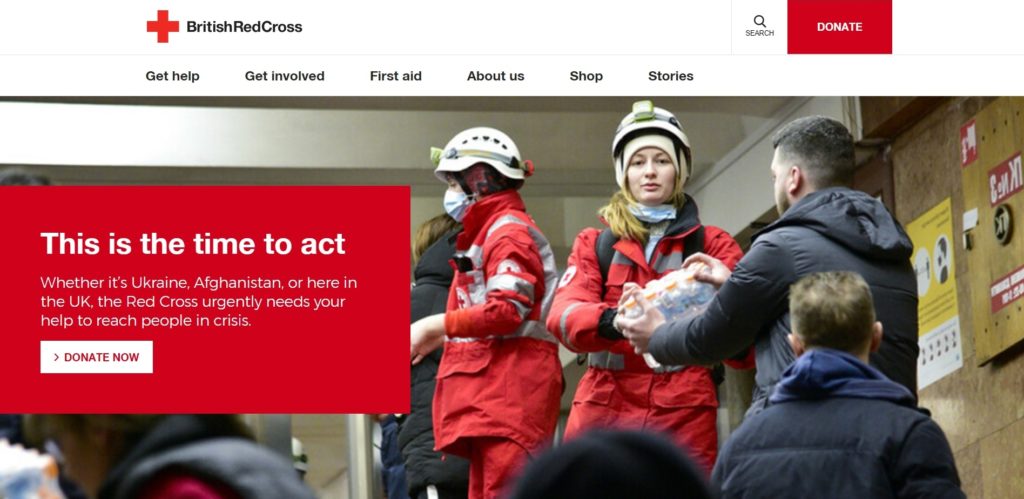
Catholic Agency for Overseas Development:
CAFOD is the official Catholic aid agency for England and Wales, bringing hope and compassion to poor communities to end poverty and injustice for people or all faiths and none.
Care International:
Founded in 1945 to provide ‘care’ packages to people recovering from war, Care International continues to fight against poverty by delivering humanitarian aid in the world’s poorest countries, with emergency response experts in more than 60 countries. It also focuses on empowering women and girls to help lead the change.
Christian Aid:
Christian Aid is a partnership of people, churches and local organisation with a vision to end poverty, supporting local people in poor countries to understand the causes of poverty and how to fight it. It uses its resources in countries affected by crisis situations to save lives and support people in the longer term.
Concern:
Concern Worldwide is an international humanitarian organisation that strives for a world free from poverty, fear and oppression. It delivers life-saving and life-changing interventions to some of the world’s poorest and most vulnerable people, including rapid emergence response.
International Rescue Committee:
Founded in 1933 at the call of Albert Einstein, the International Rescue Committee helps those whose lives and livelihoods have been shattered by conflict and disaster to survive, recover and rebuild. Today it works in more than 40 crisis-affected countries and conflict zones, as well as helping refugees integrate into new communities.
Islamic Relief:
As well as responding to disasters, Islamic Relief also promotes sustainable economic and social development by working with local communities – regardless of race, religion or gender. It has been responding to emergencies for more than 30 years, providing a lifeline for vulnerable communities affected by conflict and natural disasters, and has a presence in more than 40 countries around the world.
Oxfam:
Established in 1942, Oxfam is a global movement that fights the injustice of poverty. It seeks to save and rebuild lives in disasters and help people to build better lives for themselves and those around them. It also tackles issues such as inequality, discrimination against women and climate change.
Plan International:
Plan International is a global children’s charity that works to give every child the same chances in life. It works to ensure children in the world’s poorest communities have access to education, healthcare and clean water, and when disaster strikes it steps in to protect children and keep them safe, keep them learning and to help them recover.
Save the Children:
Working in the UK and around the world, Save the Children supports children to learn, grow and become who they want to be. When disaster strikes, it responds by delivering life-saving food, shelter and medicines where it’s urgently needed, and helps to keep children and their families safe and rebuild their lives.
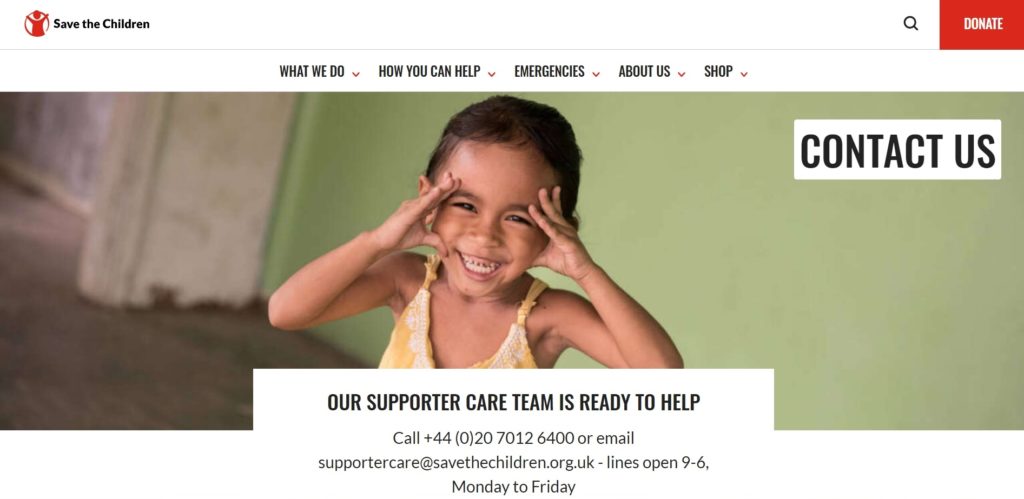
Tearfund:
Founded in 1968, Tearfund is a Christian charity that works with local churches and organisations in more than 50 countries to help communities tackle and escape the worst effects of poverty and disaster. It responds to disasters and conflicts, supporting those in greatest need through the recovery process.
World Vision:
World Vision in an international children’s charity that focuses on helping the most vulnerable children overcome poverty and experience fullness of life. It has more than 70 years’ experience and has worked in nearly 100 countries to bring positive change and when disaster strikes it can offer immediate support and help to rebuild lives.
————————————–
There are plenty of other great charities working outside of the DEC. These include War Child, a specialist charity for children affected by conflict that works to ensure a safe future for them through life-changing services and support in their communities. Médecins Sans Frontières, more commonly known as Doctors Without Borders, is an international humanitarian organisation working in more than 70 countries that sends medical teams to save lives in conflict zones, natural disasters and epidemics.
There are many more wonderful organisations doing great things to help those in need, and with a little patience and research you should be able to find at least one or two that align with your own interests. Wherever that may be, rest assured that any amount of support you can offer – be it financial, physical or emotional – will be greatly appreciated by those involved, and most notably by those who benefit from it.
Skills utilised:
Crisis Hub
Safe in your Virtual World: Using videogames as a healthy mental break from the news
Booting up your favourite game can prove a welcome respite from stressful events and give your brain a chance to relax a little.
It should come as little surprise that Safe in our World would happily support the use of videogames as a means to address your ongoing mental health wellbeing, be it in a time of crisis or just for your day-to-day troubles. Of course, gaming isn’t going to be a solution to those problems, but it does offer a place where you can leave your stresses and strains behind you for those moments after you hit the Start button.

There are plenty of obvious contenders for the kind of games you could be playing, and a quick Google search using terms such as ‘relaxing’ or ‘stress-relieving’ will throw up far more suggestions than we could possibly list here. However, there’s no real one-fit solution, as it’s all about finding a restful place in whatever kind of videogame you like – whether that’s Minecraft, Animal Crossing: New Horizons, Unpacking or Grand Theft Auto.
Of course, in times of conflict it might be wise to avoid the potential triggers of violent videogames, or those with a war theme. However, at the same time, if immersing yourself in the vast lands of Elden Ring provides a welcome refuge then by all means embrace it. Likewise, you can find games such as Valiant Hearts: The Great War, that provides a rather less-violent take on World War I, that can help you to appreciate the situation while playing more as a passive passer-by.

There can also be something satisfyingly cathartic in letting off some steam against 2D and 3D sprites in an FPS, so if the challenge of Call of Duty or the silliness of Tiny Tina’s Wonderlands helps to calm your mind, then stick with it. Indeed, we’ve got a whole article explaining how stress-inducing games can also be relaxing.
Whatever your game of choice may be, perhaps gaming’s greatest ability is the power to remove you from the real world, and drop you in a virtual one where you can have full control over your actions. While situations such as Covid-19, Ukraine and so on might lead to an apprehension and anxiety that you may feel is beyond your capacity to have any kind of directly meaningful impact upon, in a videogame you have the ability to identify and address all problems head-on, and, for the most part, have the knowledge and tools to fix them.
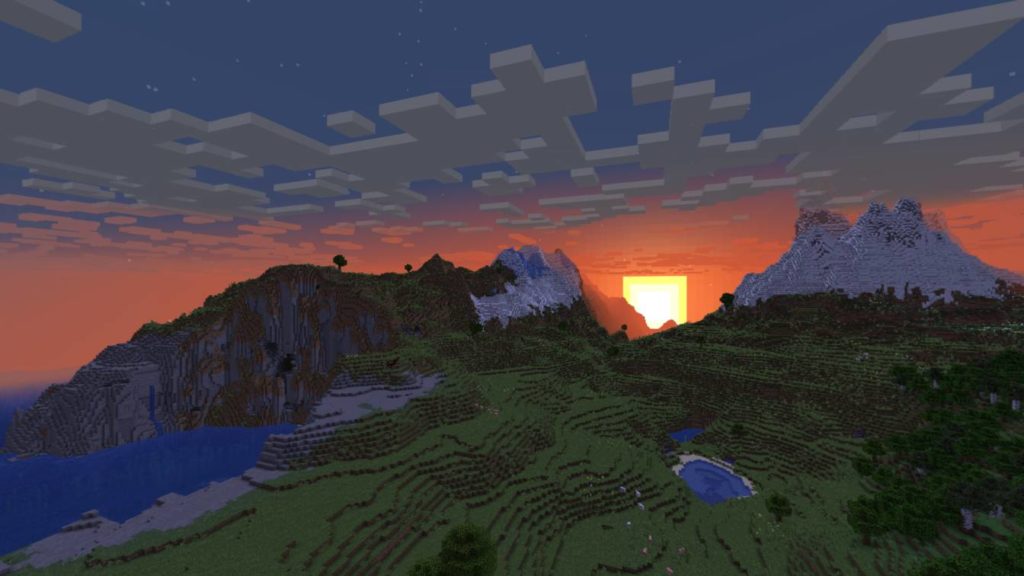
Good examples of this would include open-world or creative-based games, such as the aforementioned Minecraft and Animal Crossing: New Horizons, or No Man’s Sky, Stardew Valley and Cities Skylines. These are games that use a fixed system of relatively simple rules (well, simple once you know how!), which means that you can unwind within a virtual world that you can expand and develop completely within your control and at your own pace. You don’t even need to play them through to completion, as creating new worlds, adventures or cities simply resets the rule book back to square one and you can play the game through to different results but with the same comforting degree of control that can make hours pass like minutes.

The point is that while you can still have a lot of fun playing these games, you don’t have to think too hard about what you’re doing or worry too much about the consequences, giving your mind a healthy time-out from reality. It’s not really a case of ‘switching off’; it’s more about shifting your attention into a scenario that you can have control over, and one that has far less serious implications if something does go awry – and if it does, you have the power to make things better or just hit the ‘restart’ button.
Another side-effect of this is that your gaming routine can also bleed into the real world. Although the media (and social media) can make it hard to fully escape newsworthy events, gaming has a habit of working its way into your day-to-day thoughts. The freedom that videogames can provide comes with that ‘what do I do next?’ or ‘how do I do this?’ factor that can have you mulling over potential ideas while at work or flicking through the internet, with almost no end of YouTube videos and feature articles that will be only too keen to offer up suggestions or ways to fine-tune your latest creation.

You may already have your favourite go-to game for when you just need a little ‘me’ time, but sometimes just the simple act of picking up a controller/mouse/phone and letting your mind drift into just about any kind of alternate reality can deliver a much-needed respite. Whether you like solving puzzles, matching shapes, crafting worlds, slaying dragons, racing cars, shooting aliens, managing a football team or just guessing a five-letter word once a day, a little gaming break can prove a very useful mental one as well.
And if you do need a few more ideas for games to try out, other titles nominated by our friends and contributors that we haven’t already mentioned include: Alba, Cosy Grove, Lego Star Wars, It Takes Two, Snowrunner, Untitled Goose Game, Valheim and more. That should be enough to keep your mind busy for a little while!

Skills utilised:
Crisis Hub
Dealing with grief – advice and video games that explore themes of grief
The ongoing situation in Ukraine is affecting so many of us, inside and outside of the country itself.
Whether you live in Ukraine, in surrounding Eastern European countries, or thousands of miles away; whether you have personal ties to the conflict zone, ancestral relations or no direct connection at all, the feelings of collective stress, despair, anxiety, sadness and, indeed, grief are universally valid. To make matters worse, we are, of course, still in the throes of a global pandemic, which can amplify feelings of loss and grief both directly and indirectly.
Video games can offer escapism from reality, but can also be an invaluable tool for informing and educating – be that through first-hand reliability or perspective-broadening appreciation. Alex Thompson works at UK charity Marie Curie, whose incredible work helps people with terminal illness, and believes video games can play a vital role in helping players deal with, process and understand grief.
“When it comes to dealing with grief through the lens of video games, I think there are two ways to look at it,” says Alex.
“One is directly, in the games that tackle themes of grief and grieving head on. I played Spiritfarer last year and that is a really insightful video game that deals with themes of grief and grieving. It’s so varied in the different ways that the characters tell their stories. You take on the role of a palliative care worker, but the ways in which each character that you interact with deals with their situation, the impending climax of their journey is really interesting and different for each character. Spiritfarer is really powerful in the ways in which it forces you to interact with those characters who’re each experiencing grief and loss in their own ways.

“The other side of using games in relation to grief is pure escapism. That might be playing something that has nothing to do with grief, but that allows you to switch off and get lost in a big RPG or even something as simple as Tetris. It’s well – documented that video games can offer respite from the bad stuff going on in your life, which is, of course, really helpful for people’s mental health.”
Alex says he believes having more serious conversations around death and grief can be made easier when playing video games, because the medium itself helps to balance focus. “I’ve used video games myself for that exact purpose,” Alex continues. “I’ve played a lot of the LEGO games with my sister because that’s something we can play together. At the time, she wasn’t really into video games, so we were able to use these games as a space to chat and hang out. We were able to chat about some of the stuff we were going through at any given time, and it was easier to do so while playing games than it might have been in public. That’s one of the beauties of video games, it’s a really flexible medium.”
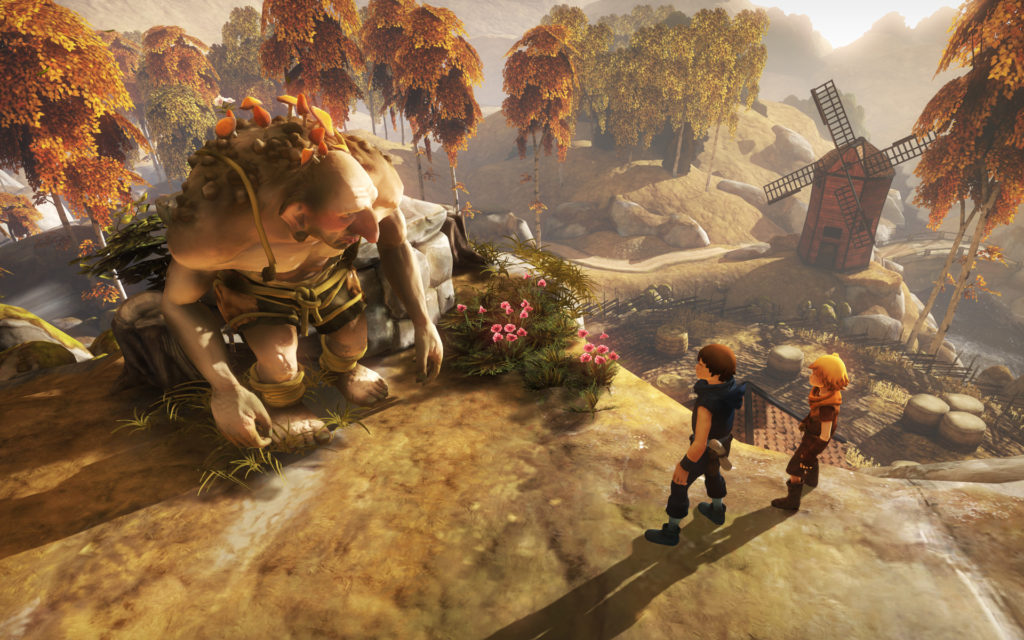
5 video games that explore themes of grief
It goes without saying that any video game that brings comfort in trying times is worth playing with escapism in mind. The following five video games are thoughtful and expressive in their approach, as they deal in and around themes of death and grief.
Animal Crossing: New Horizons
Animal Crossing: New Horizons launched on March 20, 2020, which, for many people around the world, was when nationwide quarantine and lockdown measures came into place in response to the ongoing global pandemic. As such, millions of players sought respite in this virtual version of paradise in the face of an increasingly challenging reality.
Moreover, as many people lost loved ones at a time when regular funeral services had been disrupted because of the pandemic – attendance numbers were significantly reduced, social distancing measures were put in place, singing was banned, for example – many Animal Crossing players sought to create their own tributes to lost loved ones in– game. At a time when real world exploration became impossible overnight, players used the game’s cemeteries to host in– game services and vigils for lost loved ones – poignant tributes that are still popping up in– game today.
Final Fantasy XIV: A Realm Reborn
Final Fantasy XIV: A Realm Reborn, or Final Fantasy Online as it’s less formally known, is a sprawling MMORPG (Massively Multiplayer Online Role-playing Game) that lets players create and customise characters by virtue of an extensive customisation suite – altering everything from name to race, gender, appearance, starting class and more. Quests and missions, as well as an overarching narrative provide structure for players keen to progress the game’s story, however many players use the game as a virtual playground for simply meeting up and hanging out in. As such, much like Animal Crossing above, grieving players used Final Fantasy Online to host in-game funeral services for friends who’d passed away in real life over the course of the global pandemic. Moreover, players have erected points of interest around the game world in memoriam of lost loved ones – which allows friends who don’t live in the same country to pay respects from afar by way of video games.

Journey
Journey is a beautiful, pensive and thoughtful indie game about a traveller roving the vast desert, sometimes on their own; other times alongside other players online. Denied the ability to speak via voice chat, players converse exclusively via their actions as they help one another overcome obstacles in the game’s sprawling sandswept world. While not explicitly centred around death and grief, Journey’s narrative explores death, coping with grief and being able to live with loss. In a talk delivered at the Games for Change conference in 2014, Jenova Chen, the creator of Journey, said he’d received “thousands” of personal stories from players who’d used the game to help them cope with the loss of a loved one – so powerful and cathartic is Journey in its handling and delivery of its themes.

Brothers: A Tale of Two Sons
Brothers: A Tale of Two Sons is a touching adventure game that sees two young siblings exploring a fantasy world in search of a cure for their sick father. Players assume control of both brothers at once – with each one directed by the control pad’s respective left and right analogue sticks – as they work together to overcome puzzles, defeat trolls and aid various players littered across the game world. Death and grief are omnipresent themes throughout the brothers’ journey, as are themes of struggle, suicide and wellbeing.
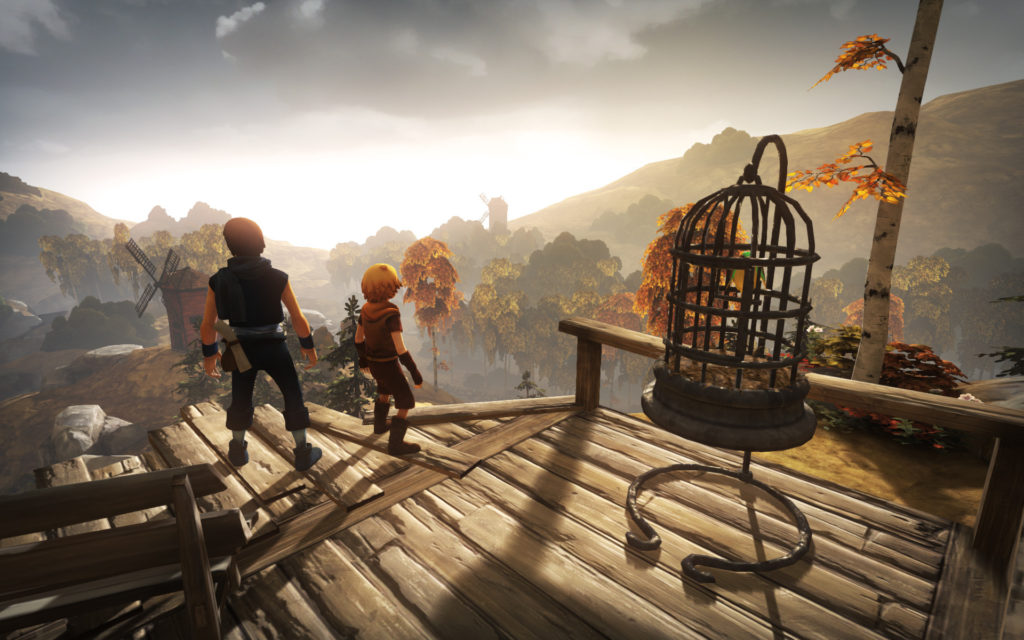
Spiritfarer
Spiritfarer is an intriguing indie adventure game where players are tasked with managing the needs of the recently deceased on a boat journey across the sea. While befriending and helping the spirits, the player character, Stella, learns of their backstories, their plights and struggles in reality, and how they came to be in this situation. Despite the fact death and grief are core themes in Spiritfarer, the game’s narrative is often lighthearted, feel good, and funny, with many aspects of the spirit’s lives (and deaths) open to interpretation and therefore relatable in the real world. The ending is a real tear-jerker, but that only serves to elevate Spiritfarer in storytelling terms.

Skills utilised:
Crisis Hub
Recognising PTSD
Post Traumatic Stress Disorder (PTSD) is a mental health issue that has existed for a very long time.
First diagnosed as a medical condition called Shell Shock during WW1 – when soldiers in the trenches were psychologically broken by the horrors of combat – and renamed Battle Fatigue during WW2, the condition was examined in more detail following the Vietnam War.
Veterans returning home from combat in SE Asia suffered greatly from feelings of detachment, hostility, numbness and rage. Suicidal thoughts – along with actual deaths – were also common.

But because these mental wounds were with them after they had returned home (rather than in the field) and were, in many ways, invisible to the outside world, it took some time for the medical profession to appreciate that these mental injuries could be widespread and long lasting; in the 80s the condition was reclassified with a new, more medical name – PTSD.
The other learning that came about during this time was that PTSD isn’t just something that affects military personnel; nor is it only triggered by direct experiences of combat and warfare. Today it’s recognised as being prevalent in survivors of mass or school shootings, near death experiences (both accidental or due to ill health), victims of sexual assault, people caught up in terrorism and more.
But while the condition is widely known and spoken about, recognising PTSD in yourself can often be challenging; yet it can have adverse effects on a person if left untreated.
PTSD usually manifests itself a few weeks after the event; although for some people it can be months or even years. Delayed PTSD can be a tricky one as people will often put the problem down to something else (i.e. it can’t be that – it was months ago, I’m fine. Maybe it’s XYZ).
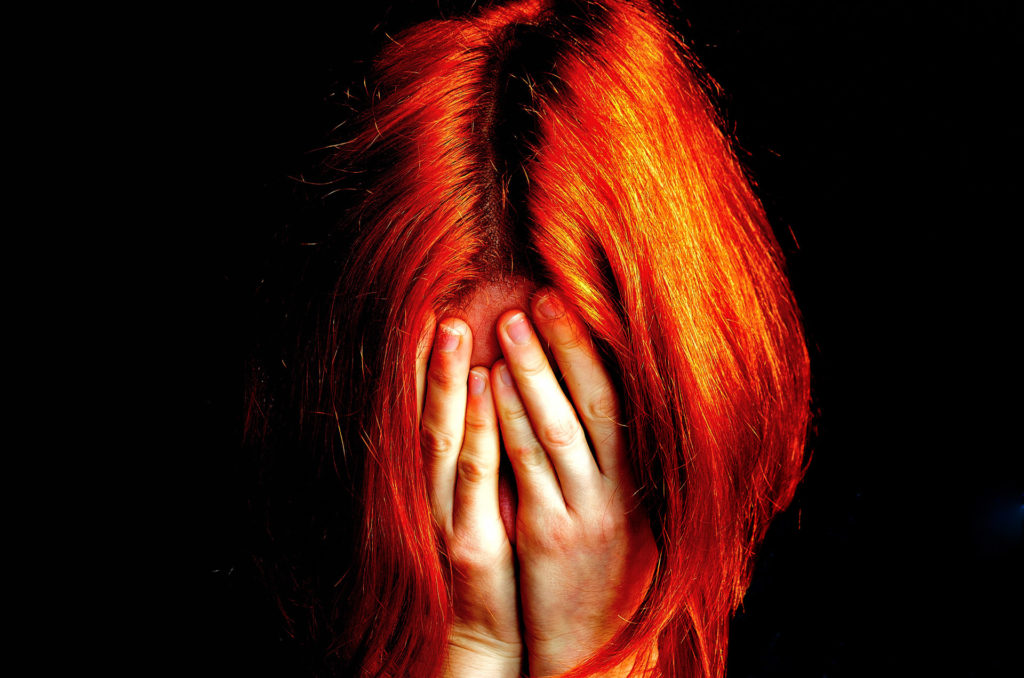
The National Health Service in Britain lists the following symptoms of PTSD (although this list is by no means exhaustive)
- Re-experiencing is the most typical symptom of PTSD. And can manifest itself as
- flashbacks
- nightmares
- repetitive and distressing images or sensations
- physical sensations, such as pain, sweating, feeling sick or trembling
- Avoidance and emotional numbing
- Hyperarousal (feeling ‘on edge’) which can in turn lead to
- irritability
- angry outbursts
- sleeping problems (insomnia)
- difficulty concentrating
Quite often, symptoms can be accompanied by other feelings or actions. Depression, anxiety and guilt are not uncommon. Drink and drug abuse can often accompany someone suffering from PTSD. Even feelings of physical pain or dizziness can occur.
Sometimes it can be hard to spot some of these feelings in yourself – especially when it comes to mood related issues – as, quite often, the change can be gradual and you may not even be aware of it yourself, but friends and family will and many will flag this to you. Your initial reaction may well be denial, anger, irritation etc; this is to be expected, but try and be mindful that they are doing this with the best of intentions and they may well be right. Take a step back, think about what’s been said and see if there’s truth in what they say.
Understanding and accepting there may be issues is, to coin a cliché, the first step on the road to recovery.
Skills utilised:
Crisis Hub
PTSD Awareness – how to support yourself and others, information and signs
After over two years of a still ongoing global pandemic, the events in Ukraine are a lot to take in, to process and to understand.
Feeling overwhelmed is a perfectly normal response to what we are seeing unfold in Eastern Europe – be that on the ground, or from a far on television and via social media – as is experiencing a range of emotions, not least frustration, sadness, helplessness and anger.

Those prone to depression or who have experienced trauma may find themselves struggling more than they otherwise might in less fraught circumstances, and while something like PTSD can take many different forms, being aware of what to look out for, and, crucially, where to turn for help is important.
PTSD is estimated to affect around one in every three people who have experienced traumatic events, and, while it can develop immediately after the experience, it can also occur weeks, months and sometimes even years later. Again, PTSD can manifest in many different ways, and can present physical, mental and emotional difficulties – with everything from trouble sleeping to unwanted memories, nightmares, flashbacks and panic attacks among the most common challenges.

Cognitive Behavioural Therapy is considered one of the most effective ways to treat PTSD, but there are a number of practical, shorter-term suggestions that can help you and/or those around you when suffering from an episode or flashback.
What you can do
Breathe
It sounds simple, but focusing on your breathing is a great way of reducing stress and feelings of panic. Try taking a deep breath, counting to five, and exhaling.

Get comfortable
Comfortable surroundings can help us relax. If that’s pouring yourself a hot drink, wrapping up in a duvet blanket, or running yourself a nice hot bath, being able to switch off from the real world and focus on yourself is key.
Allow yourself to be distracted
If possible, a long walk, run or other fitness activity is a great way of clearing the mind. If that’s not your thing, settling in with a good book, movie, television show or video game might work better. Johnny Chiodini’s Low Batteries series (published on Eurogamer back in 2015) takes a wholesome and thoughtful look at video games and mental health, with this episode specifically exploring how PTSD is handled in games.
If you’re simply looking for relaxing games to preoccupy your mind, this best relaxing games list from GamesRadar includes everything from Journey to Dreams, Animal Crossing: New Horizons, Abzu, Stardew Valley and much more.

Stay connected
Stay connected by spending time with the people who give you a sense of security, calmness and happiness, or those who best understand what you are feeling. Whether this is face-to-face or remotely via social media, instant messaging or online video games isn’t important – making connections and maintaining a sense of togetherness is. It’s worth noting that while social media can be a great way to achieve connectedness, if media exposure is impacting your wellbeing, limiting your screen time is equally important.
What friends and family can do
Listen
Listening isn’t just about making time for someone, it’s also about allowing them to be upset without judgement or pressure. Simply be there for someone without question.

Identify warning signs and learn triggers
PTSD is so idiosyncratic, which makes understanding and identifying warning signs and learning triggers especially important – for both the person with PTSD and you. Are there conversations or surroundings that tend to trigger flashbacks? Being able to avoid these can be vital, and if that’s impossible, being able to prepare for them is just as important.
Respect personal space
While being able to listen is crucial, so too is respecting the space of someone who experiences PTSD. Always ask permission if you plan to touch the person, be sure not overcrowd and do what you can to avoid startling them.
Write a crisis plan
Crisis plans can help with all of the above. Mental health charity Mind has some great, easy to follow step-by-step crisis plan advice.

Skills utilised:
Crisis Hub
